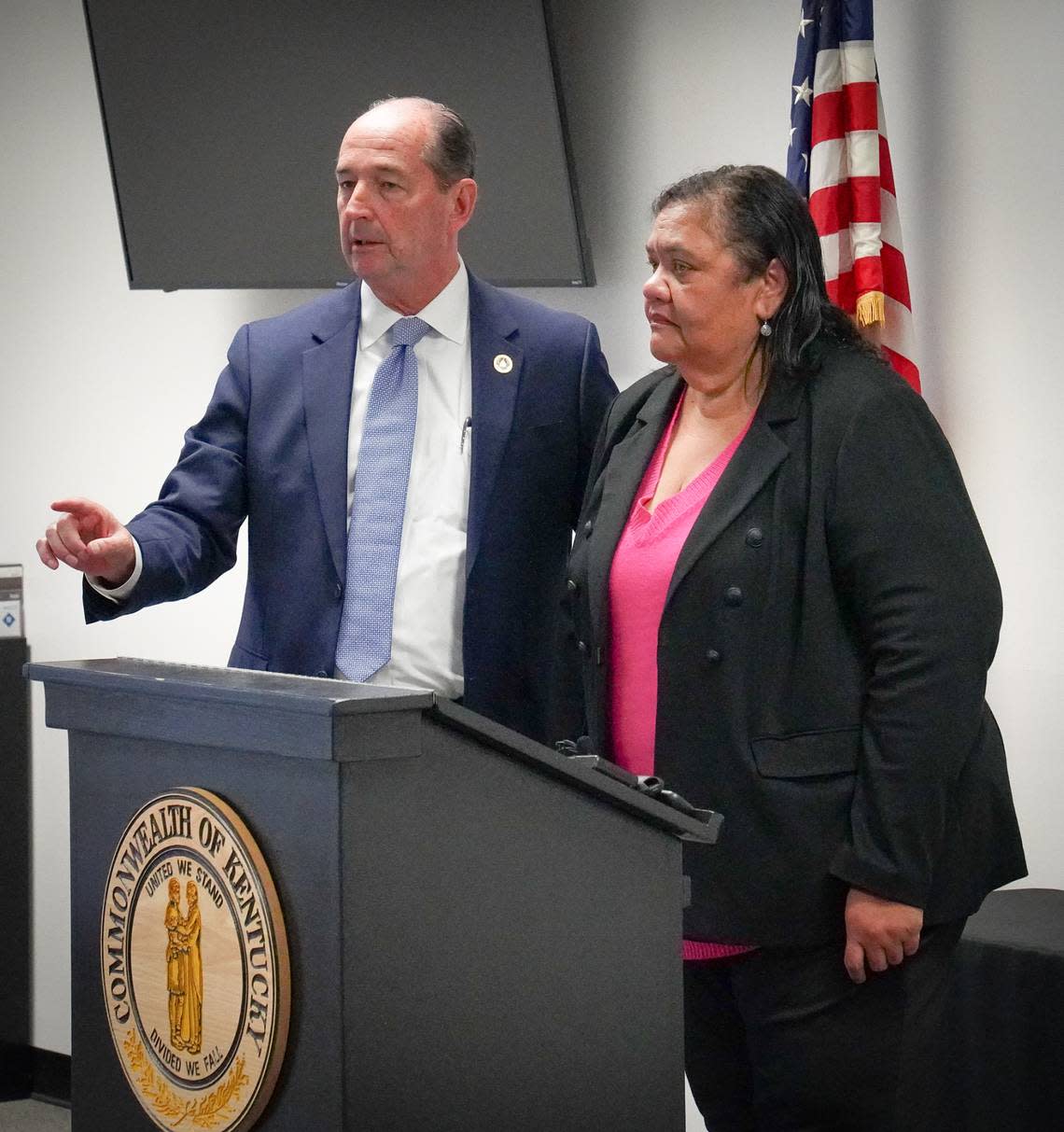KY prison leaders dodge questions on inmate sex, smuggling, but say, ‘We deal with it’

John Cheves, the Herald-Leader’s senior investigative reporter, recently spent weeks gathering documents and preparing a story about employee misconduct at the Kentucky Department of Corrections.
On Feb. 5, he requested an interview with department leaders to ask questions about a frequently occurring problem discovered in the 800-plus pages he had analyzed: Corrections employees (mostly prison guards) having inappropriate relationships with inmates, including sex inside prisons, or smuggling drugs and other contraband for inmates.
Cheves, a 27-year Herald-Leader veteran, had several questions for state officials.
Does the department consider these incidents to be serious? Given how often the department learns of misconduct through a tipster — sometimes inmates or their families — should we worry about cases that go undetected? What makes some correctional officers more vulnerable than others to corruption?
What can the department do better to protect the professional barrier that should exist between officers and inmates? How much does the agency’s under-staffing contribute to the problem?
On Feb. 14, Corrections Commissioner Cookie Crews and Deputy Commissioner Scott Jordan agreed to a phone interview that lasted about 10 minutes.
But they weren’t keen on directly answering the Herald-Leader’s questions.
Sign up for our Bluegrass Politics Newsletter
A must-read newsletter for political junkies across the Bluegrass State with reporting and analysis from the Lexington Herald-Leader. Never miss a story! Sign up for our Bluegrass Politics newsletter to connect with our reporting team and get behind-the-scenes insights, plus previews of the biggest stories.
Crews opened the conversation with a prepared statement to explain that she has worked with some “amazing people” during her three decades rising through the ranks at the Department of Corrections.
“Sometimes, along the way, people take another path. And when they do take another path, you know — all of the claims are fully investigated by appropriate subject matter experts, regardless of how that is received,” Crews said.
“All the investigations are reviewed by leadership to determine the appropriate action, if any, and all disciplinary action is reviewed by the appropriate deputy commissioner and H.R. (human resources), you know, to make sure we are doing the same thing across the board,” she said.
Next, Jordan explained that department policy requires any employee who knows about wrongdoing to report it, whether they send an email, slip a note under an office door or “write it on a matchbook and put it on somebody’s windshield.”
“I’m pretty confident in saying that if it happens, we become aware of it and we deal with it very rapidly,” Jordan said.
Finally, the Herald-Leader was invited to ask a couple of questions. Cheves started by asking if the 30 cases he found of employees and inmates having inappropriate relationships over a 16-month period should be considered “too many.” Is this situation as bad as it looks from the outside?
“As we’ve stated,” Jordan replied after a brief pause, “if we receive a complaint through any of the means we’ve mentioned before, we investigate them to the fullest, we take appropriate action necessary on a case-by-case basis.
“If it rises to the level of what you mentioned as an intimate relationship or any kind of physical contact, you understand that we are not law enforcement,” he continued. “At that point, we contact state police or local law enforcement and get them involved.”
Cheves asked again: “But the issue of relationships between inmates and DOC (Department of Corrections) staff, how serious a problem is that?”
Jordan replied: “We haven’t really noticed an increase in late of that at all. Again, all are created equal to us. We get a complaint of any nature, we handle it the same in a very systematic, expedited and serious manner.”
Cheves followed up: “Is there something we can do to better defend against this?”
“We have a policy in place that tells us our people have to report. And they do,” Crews said.
“We end up — people are trained every year,” Crews added. “You know, they have to go back and do training, 40 hours of training. We retrain. And if we see a big amount of just things happening at a prison, we will go in and do special training. Like, ‘OK, this seems to be an issue, we’re going to isolate just this institution and say we’re going to train again just to make sure everybody understands.’”
Cheves asked: “Is that something in recent years you guys have had to do, on this subject of inappropriate relationships?”
“No, we haven’t,” Crews said.
Finally, the Herald-Leader asked if there was anything either of the corrections officials wanted to say directly about the problem of inappropriate employee-inmate relationships inside Kentucky state prisons.
“I hope you put in there that we disciplined them and what the discipline was,” Crews said.
Cheves then pivoted to the problem of corrections employees smuggling contraband into prisons. Is there something the prison system can do better to guard against smuggling?
“As I stated earlier,” Jordan replied, “we handle every piece of information the same, whether it be contraband or a relationship or whatever. The truth of the matter is, if we were not handling these situations in a very aggressive manner, the numbers would not be what they were. The reason the numbers are high is because we’re doing what we’re supposed to do.”
“I guess the bottom line and the way we can sum this up: If anybody wants a job with the Department of Corrections and meets the criteria, we will be glad to have them,” Jordan said. “But everybody needs to know upfront — and they do know upfront — that misconduct will not be tolerated. We will deal with it very rapidly.”
At that point, the spokeswoman for the Justice and Public Safety Cabinet, Morgan Hall, said she was concluding the interview.
“The commissioner and deputy have meetings to go to, you know how it works over here,” Hall said.

